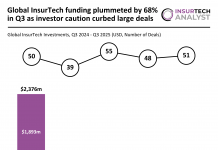ZestyAI, a leading provider of climate and property risk analytics solutions, has announced that it has received approval from the Texas Department of Insurance for its comprehensive suite of Severe Convective Storm products.
This suite includes Z-HAIL™, Z-WIND™, Z-STORM™, and Z-PROPERTY™ Roof Quality, now joining the previously approved Z-FIRE™ predictive wildfire risk analytics product.
Texas, with over 1,100 hail events in 2023 alone, experiences the highest number of annual hail claims in the US.
This high incidence of severe storms is a key reason ZestyAI chose Texas as one of the first states to file its Severe Convective Storm product suite as a licensed Advisory Organisation.
ZestyAI’s storm products have already received approvals from the Colorado Division of Insurance and the Illinois Department of Insurance earlier this year. More approvals from other states in the hail belt are expected in the coming months.
Leading insurers have already licensed these models to enhance underwriting, optimise portfolios, and more accurately align premiums with Severe Convective Storm risk.
The firm’s suite of storm products are AI-powered climate risk models designed to predict the frequency and severity of severe storm claims for every property in the US.
These products analyse the interaction of climatology, geography, and the unique characteristics of each structure and roof in 3D, considering accumulated damage from historical storms.
Rooted in decades of scientific research and trained on extensive loss data, these models are considered the most accurate solutions available.
With ZestyAI’s models, carriers can shift from territory-based segmentation to property-by-property risk assessment.
Benefits include enhanced underwriting, improved product fit, capturing low-risk market share, and portfolio optimisation.
The approval also allows carriers to adopt ZestyAI’s Roof Quality product, which was comprehensively reviewed and approved by the Department as part of this filing.
ZestyAI’s models are built and validated on large amounts of real claims data, generating the highest lift in the insurance industry. They are highly transparent, providing the top factors contributing to each risk score.
Insurance underwriters or agents can modify risk inputs in real-time and offer specific feedback to homeowners and business owners on the impact of risk mitigation actions.
Bryan Rehor, Director of Regulatory Affairs at ZestyAI, commented, “This approval gives our carrier partners a significant edge. Since our models have already been successfully reviewed, subsequent filings will be expedited, leading to faster approvals. This reduces the time and resources our partners need for their own approvals and ultimately increases the availability of high-quality insurance for property owners in Texas.”
ZestyAI has always recognised the importance of regulatory approvals in the ethical and transparent implementation of AI in insurance.
The company is committed to understanding and complying with regulatory policy while also influencing how the industry navigates the ethical use of AI in insurance.
As leaders in securing approvals for AI-powered risk models, ZestyAI collaborates closely with numerous regulatory bodies, consistently achieving successful outcomes.
The company actively shapes regulations through regular model audits, bias testing, scientific data selection, and continuous engagement with regulators.
This proactive approach has established ZestyAI as the go-to risk analytics partner for leading insurance carriers across the nation.
Copyright © 2024 InsurTech Analyst










